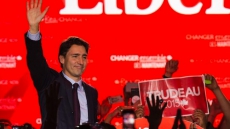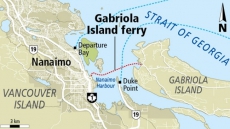OTTAWA — Canada's Senate, often accused of being an anachronism, is being asked to wrestle with the futuristic dream of driverless cars.
Transport Minister Marc Garneau wants the Senate's transportation and communications committee to launch a study of the regulatory, policy and technical issues that need to be addressed so that Canada can safely and smoothly make the transition to self-driving vehicles — a coming automotive revolution that's already being road tested in Ontario and elsewhere.
His request for a Senate study is part of the Trudeau government's attempt to recast the much-maligned upper house as an independent and valued institution that has an important parliamentary role to play.
It follows Prime Minister Justin Trudeau's creation of an arm's-length advisory board to recommend non-partisan nominees for appointment to the Senate.
Among other things, Garneau says the committee should examine the potential for Canada to set standards for the development of automated cars that can operate safely on icy winter roads.
"The technology I'm talking about is not science fiction," Garneau said during an appearance late Wednesday before the Senate committee.
"It is in development today and has the potential to improve safety, efficiency and the environmental performance of transportation in Canada and other countries."
Still, he said there are many questions that must be addressed, including the long-term impact on privacy, energy, land use, transportation demand and employment.

Garneau and Canadian Heritage Minister Melanie Joly were invited to appear Wednesday before the committee to discuss the mandate letters given to them by Prime Minister Justin Trudeau when they took charge of their portfolios. Garneau took the opportunity to ask the committee to launch a driverless car study.
"I'm one of these people who believes that the Senate is part of Parliament, that has done some very serious and very important and groundbreaking studies and I want to engage with them in the most productive possible way," Garneau said in an interview.
Self-driving vehicles have the potential to make driving safer, he said, noting that automated vehicles "don't fall asleep, they don't drink." And they're potentially more energy efficient because "there's less of a heavy foot on the gas and heavy foot on the brake kind of driving."
But there are also challenges, like ensuring vehicles have backups should their computer systems fail and figuring out how to replicate human judgment in unpredictable winter driving conditions.
Driverless vehicles will automatically keep a safe distance from other vehicles but, Garneau noted: "We in Canada have to make judgment calls in the winter time when we're on icy roads and black ice. So that's got to be part of it as well because they're not all nice California roads."
Moreover, Garneau said automated cars raise issues of liability and insurance, cyber security, to ensure that vehicles' computer systems can't be hacked, and privacy, to protect those who don't want their whereabouts constantly tracked.

"There are rules and regulations that will have to be put in place that don't exist at the moment."





